TORONTO, ON / ACCESSWIRE / May 1, 2023 / Aston Bay Holdings Ltd. (TSXV:BAY)(OTCQB:ATBHF) ("Aston Bay" or the "Company") reports an update on drilling and geophysical activities at the Storm Copper Project ("Storm" or the "Project") on Somerset Island, Nunavut, Canada. This is the second drilling program for American West Metals Limited ("American West"), who are the project operator, since entering an option agreement with Aston Bay in March 2021.
An extensive Reverse Circulation (RC) drilling program and Moving Loop Electromagnetic (MLEM) survey are now underway at the 4100N Zone. The drilling program will initially aim to define maiden copper resources at the 4100N, 2750N and 2200N Zones, and then test key exploration targets. Surface electromagnetic geophysics is underway to highlight enriched zones of mineralization, refine targets for the remaining resource drilling and define new drill targets.
Visual estimates of mineral abundance should never be considered a proxy or substitute for laboratory analyses where concentrations or grades are the factors of principal economic interest. Laboratory assays are required to determine the presence and grade of any contained mineralization within the reported visual intersections of copper sulfides. Portable XRF is used as an aid in the determination of mineral type and abundance during the geological logging process.
Highlights
-
Four Reverse Circulation (RC) drill holes completed at the 4100N Zone with all drill holes intersecting thick intervals (core length) of copper sulfide, including:
- 24.4m of strong visual copper sulfides from 48.8m in SR23-01
- 27.4m of strong visual copper sulfides from 56.4m in SR23-02
- 48.7m of strong visual copper sulfides from 54.9m in SR23-03
- 30.6m of strong visual copper sulfides from 50.3m in SR23-04
- The 4100N drilling program is designed to define resources where extensive near-surface copper mineralization has been identified previously
- The first batch of drill samples has been sent to the laboratory for analysis
- RC drilling continues at Storm with a further 12 drill holes planned at the 4100N Zone to be followed by drilling at other high-grade copper targets
- Moving Loop Electromagnetics (MLEM) has commenced at the 4100N Zone and has already identified two new strong conductors that are untested
"We are very pleased with the impressive progress of our partner American West Metals in this early exploration program," stated Thomas Ullrich, CEO of Aston Bay.
"The use of a helicopter portable RC drill rig has allowed the earliest ever start to a drill program at Storm, and our partners are well positioned to complete the work required to define maiden copper resources at the 4100N, 2750N and 2200N Zones this year. The detailed MLEM program, also underway and already yielding actionable results, is proving to be valuable in refining targets for the resource drilling as well as defining new targets for additional discovery."
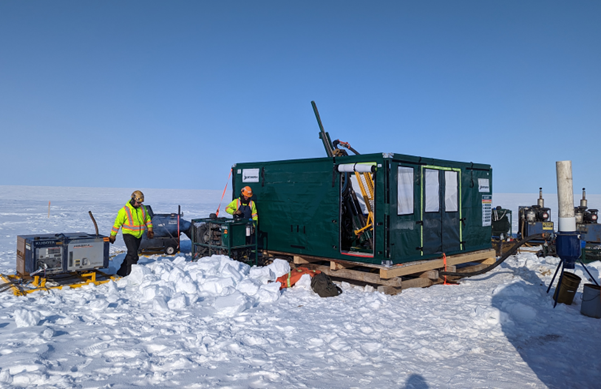
IMMEDIATE SUCCESS HIGHLIGHTS RESOURCE POTENTIAL
The first four completed drill holes at the 4100N Zone have begun to confirm the continuity of the copper zones and highlight the resource potential of the near-surface mineralization. All drill holes have intersected thick intervals of visual sulfides, which have been confirmed to contain copper based on portable XRF analysis.
Over 3,000m of historical drilling at the 4100N Zone has identified widespread copper sulfide mineralization over an area of approximately 32 hectares. This mineralization is a focus for resource drilling due to its shallow nature and potential to provide a significant resource base as the basis for an initial low-cost, open-pit mining operation.
DRILL HOLE DETAILS
Drill holes SR23-01, SR23-02, SR23-03 and SR23-04 have intersected thick intervals of copper sulfide mineralization, hosted within dolomite of the Allen Bay Formation.
The mineralization encountered within the drilling to date comprises zones of strong sulfides hosted within a broad mineralized package of what is interpreted to be mostly vein and fracture-style mineralization. The mineralized horizons are interpreted to be relatively flat-lying and hosted within a porous, laterally extensive carbonate layer.
The dominant copper sulfide mineral observed within the drill holes to date is chalcocite, with minor bornite and chalcopyrite on the margins of the mineralized intervals and within veins. Minor native copper and copper oxides (mostly malachite and cuprite) are also present.
Chalcocite is an important ore mineral due to its high copper content (79.8% copper) and outstanding metallurgical properties.
The Allen Bay host unit is present throughout the Storm Project area and is composed of massive to thinly bedded dolomicrites.
Hole ID |
Prospect |
Easting |
Northing |
Depth (m) |
Azi |
Inclination |
Type |
SR23-01 |
4100N |
464991 |
8174285 |
137.2 |
180 |
-65 |
RC |
SR23-02 |
4100N |
464990 |
8174157 |
140.2 |
180 |
-59 |
RC |
SR23-03 |
4100N |
465041 |
8174251 |
151 |
178 |
-65 |
RC |
SR23-04 |
4100N |
465045 |
8174166 |
152.4 |
179 |
-69 |
RC |
Table 1: 2023 program drill hole details. Note - depth in metres has been converted from measurements in feet and is rounded.
Intersections are expressed as downhole widths and are interpreted to be close to true widths. Visual estimates of sulfide type, quantity and habit should not be considered a substitute for laboratory assays. Portable XRF analysis has been used to confirm the nature of the sulfide intercepts. Laboratory assays are required to determine the widths and grade of mineralization as reported in preliminary geological logging.
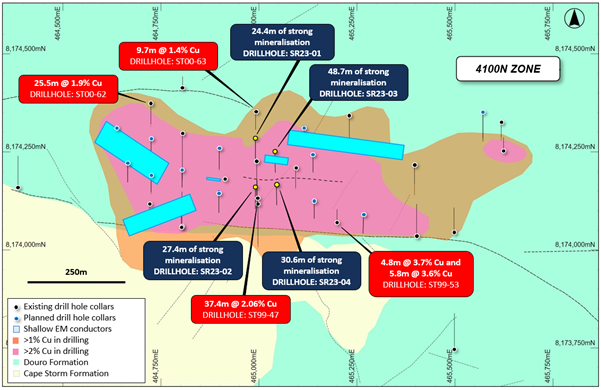
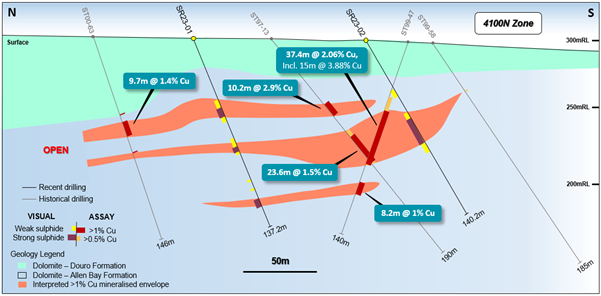
Mineralization key: cc = chalcocite, chpy = chalcopyrite, br = bornite, py = pyrite, Cu = native copper, ct = cuprite, ml = malachite, sph = sphalerite, ga = galena. (5%) = visual estimation of sulfide content.
Hole ID |
From (m) |
To (m) |
Min |
Description |
SR23-01 |
0.0 |
21.3 |
|
Cape Storm Formation |
|
21.3 |
48.8 |
|
Allen Bay Formation |
|
48.8 |
54.9 |
ml, cpy, cc |
veinlets of ml with cpy selvage and trace cc, (1%) |
|
54.9 |
59.4 |
cc, ml, ct |
cc veinlets with ct and trace ml (2.5%) |
|
59.4 |
64.0 |
ml, ct |
trace ml veinlets with ct selvage |
|
64.0 |
80.8 |
py |
Allen Bay Formation |
|
80.8 |
86.9 |
cc, py |
cc veinlets and trace blebby py (1.5%) |
|
86.9 |
99.1 |
ml, py, ct |
trace ml veinlets with patchy ct and trace blebby py with chert (<1%) |
|
99.1 |
106.7 |
Cu, cc, py, ct |
native Cu and py in vein selvage with cc and ct (4%) |
|
106.7 |
114.3 |
|
Massive to weakly bedded dolomudstone with minor cherty bands |
|
114.3 |
117.3 |
py, cc |
dense py veinlets with cc and selvage ct (2.5%) |
|
117.3 |
121.9 |
Cu, py |
dense py veins with abundant fine native Cu stringers and selvage (5%) |
|
121.9 |
125.0 |
ml, py, ct |
ml veinlets with ct selvage and blebby py (<1%) |
|
125.0 |
126.5 |
cc, ml, ct |
cc veinlets with ml selvage and trace ct (1%) |
|
126.5 |
137.2 |
Allen Bay Formation |
Table 2: Summary geological log for drill hole SR23-01.
Hole ID |
From (m) |
To (m) |
Min |
Description |
SR23-02 |
0.0 |
24.4 |
ml |
Cape Storm Formation |
|
24.4 |
39.6 |
ml |
Allen Bay Formation |
|
39.6 |
47.2 |
ml, py, cc |
trace cc veinlets with py and ml selvage (1%) |
|
47.2 |
53.3 |
py |
py in recrystalized dolomudstone (1%) |
|
53.3 |
56.4 |
ml, ct |
trace ml and ct in fractures at top of interval |
|
56.4 |
68.6 |
Cu, cc, py, cpy |
cc veinlets with selvage Cu, trace cpy (1.5%) |
|
68.6 |
76.2 |
py, cc |
dense cc veinlets and patchy py (1.5%) |
|
76.2 |
83.8 |
cc, Cu, py |
cc veinlets with Cu in selvage and patcy py (2%) |
|
83.8 |
88.4 |
cc, py, ml |
trace cc veinlets with py and ml selvage (<1%) |
|
88.4 |
91.4 |
Cu, cc, ml |
patchy cc and Cu, trace ml veinlets (<1%) |
|
91.4 |
108.2 |
py, ml |
trace patchy py and ml (<1%) |
|
108.2 |
111.3 |
cc, ml |
cc veinlets and selvage ml at bottom of unit |
|
111.3 |
140.2 |
py |
Allen Bay Formation |
Table 3: Summary geological log for drill hole SR23-02.
Hole ID |
From (m) |
To (m) |
Min |
Description |
SR23-03 |
0.0 |
39.6 |
|
Cape Storm Formation |
|
39.6 |
54.9 |
cc, py, chpy |
cc veinlets with selvage chpy and py (0.5%) |
|
54.9 |
68.6 |
cc, chpy, sph, py |
abundant cc veinlets with selvage chpy, sph and py (2%) |
|
68.6 |
73.2 |
cc, chpy, py |
trace cc veinlets with selvage chpy and py (0.5%) |
|
73.2 |
83.8 |
cc, br, chpy, py, sph |
abundant cc and chpy veinlets with patchy br, sph, Cu veinlets and py (1.5%) |
|
83.8 |
100.6 |
cc, br, chpy, py, sph |
abundant cc and chpy veinlets with patchy br, sph, Cu veinlets and py (1.5%) |
|
100.6 |
106.7 |
cc, chpy |
cc veinlets and patchy chpy (0.5%) |
|
106.7 |
109.7 |
chpy, ga |
chpy veinlets and trace ga (1%) |
|
109.7 |
114.3 |
chpy, py |
trace chpy veinlets with minor py (0.5%) |
|
114.3 |
121.9 |
chpy, py |
dense chpy veins and patchy py (2%) |
|
121.9 |
137.2 |
cpy, cc, py |
cc and chpy veinlets and minor py (0.5%) |
|
137.2 |
140.2 |
cc, cpy |
abundant cc veinls with patchy chpy (1%) |
|
140.2 |
150.9 |
cpy |
Allen Bay Formation |
Table 4: Summary geological log for drill hole SR23-03.
Hole ID |
From (m) |
To (m) |
Min |
Description |
SR23-04 |
0.0 |
27.4 |
|
Cape Storm Formation |
|
27.4 |
41.1 |
|
Allen Bay Formation |
|
41.1 |
47.2 |
chpy, py, ml |
ml veinlets with selvage py and chpy (0.5%) |
|
47.2 |
50.3 |
chpy, ml, cc |
cc veinlets with selvage chpy and ml (0.5%) |
|
50.3 |
51.8 |
ml, chpy |
abundant ml veinlets with patchy chpy (0.2%) |
|
51.8 |
61.0 |
cc, ml, ct, py, chpy |
cc and py veinlets with patchy selvage ml, ct and chpy (0.5%) |
|
61.0 |
70.1 |
py |
trace py veinlets (0.2%) |
|
70.1 |
79.2 |
ml, ct, py |
ml veinlets with patchy selvage py and ct (0.2%) |
|
79.2 |
82.3 |
cc, ml, ct |
cc veinlets with selvage ct and ml (0.5%) |
|
82.3 |
83.8 |
ct, Cu, py |
ct veinlets with patchy Cu and trace py (0.2%) |
|
83.8 |
100.6 |
Cu, cc, py |
cc veinlets with Cu and patchy py (1%) |
|
100.6 |
102.1 |
py |
trace py veinlets (0.2%) |
|
102.1 |
115.8 |
ml, cc |
cc veinlets with patchy ml (0.5%) |
|
115.8 |
137.2 |
ml |
trace patchy ml (0%) |
|
137.2 |
152.4 |
|
Allen Bay Formation |
Table 5: Summary geological log for drill hole SR23-04.
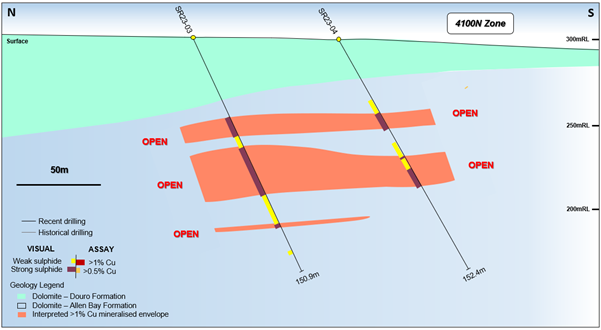
MOVING LOOP ELECTROMAGNETICS (MLEM)
Moving loop electromagnetics (MLEM) is underway in parallel with the drilling to follow up on 11 shallow, high-priority EM conductors that were identified by the fixed loop electromagnetic (FLEM) survey completed by the Company during the 2021 field season.
Four out of a total of fifteen survey lines have been completed to date within the western part of the 4100N Zone.
Two strong, untested MLEM conductors have been identified, and both conductors are located close to historical copper intersections (including 25.5m (core length) @ 1.9% Cu from 78.8m in ST00-62).
Conductor 1 has been modeled as 30m x 100m, 65-degree northerly dip, 70-80m deep, and with a conductance of 600-900 Siemens (s). Conductor 2 is 75m x 25m with a shallow south dip, at approximately 60-70m depth, and with a conductance of 600-900s.
These new EM data outline zones of potentially more massive copper sulfide mineralization within the 4100N Zone. Historical conductors that have been tested with drilling are known to be associated with high-grade copper sulfides.
The planned drilling will be refined to test these new conductors as part of the resource definition drilling. MLEM surveys will also be completed at the 2750N and 2200N Zones.
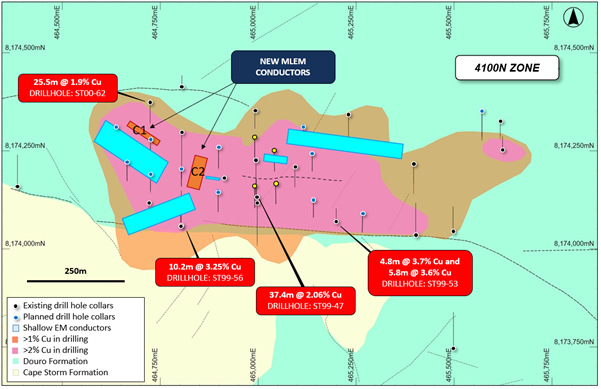
PLANNED PROGRAM
Drilling at the 4100N Zone will be followed by resource definition at the 2200N and 2750N Zone, where drilling during 2023 intersected high-grade copper sulfides close to surface including 41m (core length) @ 4.18% Cu from 38M (ST22-05) downhole.
The first batch of samples has been sent to the laboratory, with results expected within two months.
Once the resource definition programs are complete, new areas for exploration will include the Blizzard, Tornado and Tempest Prospects. The Tempest Prospect is located approximately 40 kilometres south of the Storm deposits, and it contains a large (>250m long) copper gossan exposed at surface with assays up to 32% Cu. Its location and distance from Storm highlight the extensive nature of the prospective copper mineralization within the Project area.
Diamond drilling will be used to test the high-priority exploration targets and is expected to commence after the completion of the resource drilling.
Sorting and beneficiation test work for a potential direct shipping product (DSP) operation is continuing with results to follow shortly.
About the Storm Copper and Seal Zinc-Silver Projects, Nunavut
The Nunavut property consists of 173 contiguous mining claims covering an area of approximately 219,257 hectares on Somerset Island, Nunavut, Canada. The Storm Project comprises both the Storm Copper Project, a high-grade sediment hosted copper discovery (intersections including 110m* @ 2.45% Cu from surface and 56.3m* @ 3.07% Cu from 12.2m) as well as the Seal Zinc Deposit (intersections including 14.4m* @ 10.58% Zn, 28.7g/t Ag from 51.8m and 22.3m* @ 23% Zn, 5.1g/t Ag from 101.5m). Additionally, there are numerous underexplored targets within the 120-kilometre strike length of the mineralized trend, including the Tornado copper prospect where 10 grab samples yielded >1% Cu up to 32% Cu in gossans.
*Stated drill hole intersections are all core length, and true width is expected to be 60% to 95% of core length.
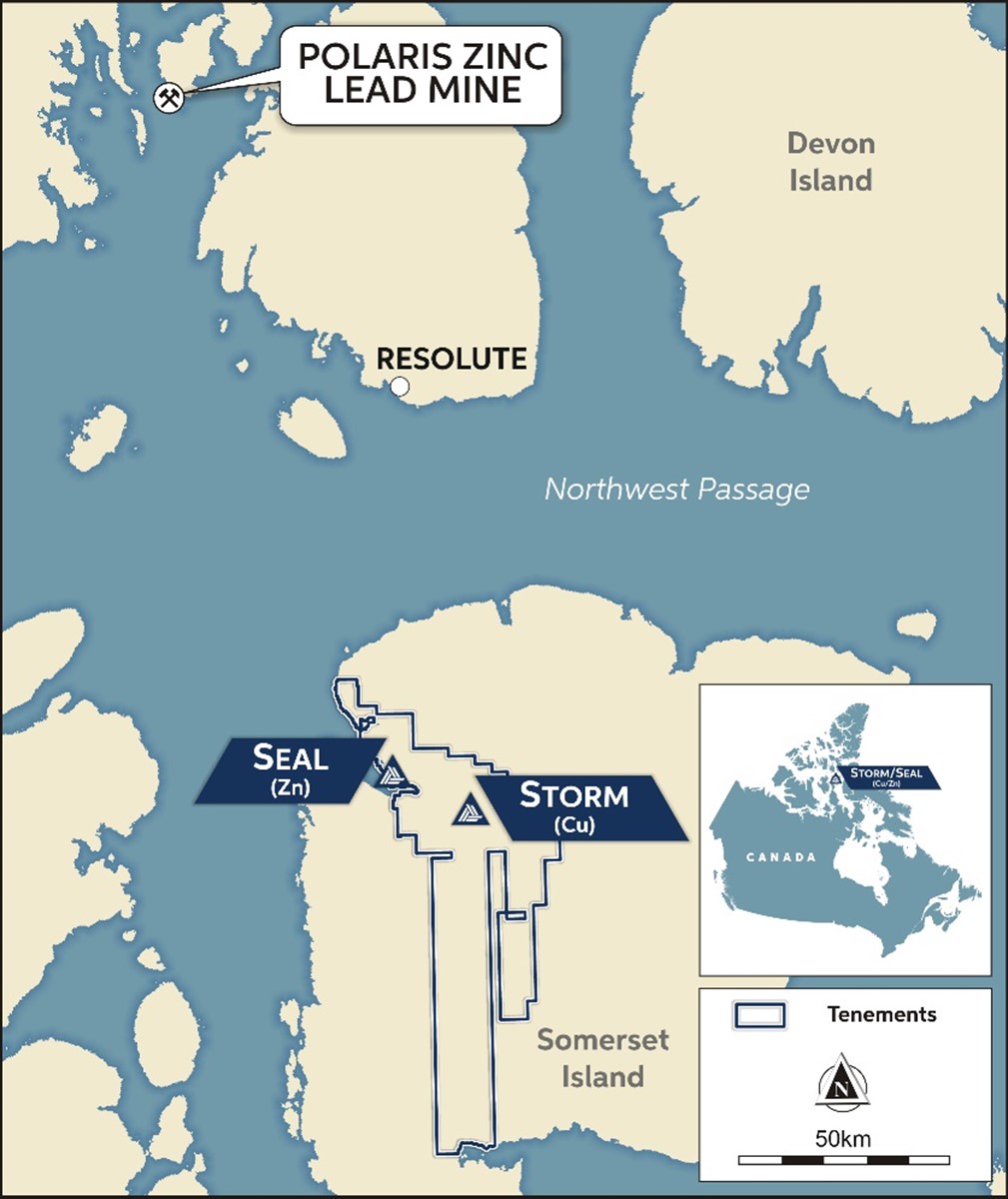
Qualified Person
Michael Dufresne, M.Sc., P.Geol., P.Geo., is a qualified person as defined by National Instrument 43-101 and has reviewed and approved the scientific and technical information in this press release.
About Aston Bay Holdings
Aston Bay is a publicly traded mineral exploration company exploring for high-grade copper and gold deposits in Virginia, USA, and Nunavut, Canada. The Company is led by CEO Thomas Ullrich with exploration in Virginia directed by the Company's advisor, Don Taylor, the 2018 Thayer Lindsley Award winner for his discovery of the Taylor Pb-Zn-Ag Deposit in Arizona. The Company is currently exploring the high-grade Buckingham Gold Vein in central Virginia and is in advanced stages of negotiation on other lands with high-grade copper potential in the area.
The Company is 100% owner of the Storm Project property, which hosts the Storm Copper Project and the Seal Zinc Deposit and has been optioned to American West Metals Limited.
About American West Metals Limited
AMERICAN WEST METALS LIMITED (ASX: AW1) is an Australian clean energy mining company focused on growth through the discovery and development of major base metal mineral deposits in Tier 1 jurisdictions of North America. Our strategy is focused on developing mines that have a low-footprint and support the global energy transformation.
Our portfolio of copper and zinc projects in Utah and Canada include significant existing resource inventories and high-grade mineralization that can generate robust mining proposals. Core to our approach is our commitment to the ethical extraction and processing of minerals and making a meaningful contribution to the communities where our projects are located.
Led by a highly experienced leadership team, our strategic initiatives lay the foundation for a sustainable business which aims to deliver high-multiplier returns on shareholder investment and economic benefits to all stakeholders.
For further information on American West, visit: www.americanwestmetals.com.
FORWARD-LOOKING STATEMENTS
Statements made in this news release, including those regarding the Option Agreement, grant of the Option and the expected closing date, American West's interest in the Storm Project and its other acquisitions and plans, plans for the upcoming field season, management objectives, forecasts, estimates, expectations, or predictions of the future may constitute "forward-looking statement", which can be identified by the use of conditional or future tenses or by the use of such verbs as "believe", "expect", "may", "will", "should", "estimate", "anticipate", "project", "plan", and words of similar import, including variations thereof and negative forms. This press release contains forward-looking statements that reflect, as of the date of this press release, Aston Bay's expectations, estimates and projections about its operations, the mining industry and the economic environment in which it operates. Statements in this press release that are not supported by historical fact are forward-looking statements, meaning they involve risk, uncertainty and other factors that could cause actual results to differ materially from those expressed or implied by such forward-looking statements. Although Aston Bay believes that the assumptions inherent in the forward-looking statements are reasonable, undue reliance should not be placed on these statements, which apply only at the time of writing of this press release. Aston Bay disclaims any intention or obligation to update or revise any forward-looking statement, whether as a result of new information, future events or otherwise, except to the extent required by securities legislation.
For more information contact:
Thomas Ullrich, Chief Executive Officer
thomas.ullrich@astonbayholdings.com
(416) 456-3516
Sofia Harquail, IR and Corporate Development
sofia.harquail@astonbayholdings.com
(647) 821-1337
SOURCE: Aston Bay Holdings Ltd
View source version on accesswire.com:
https://www.accesswire.com/752086/Aston-Bay-Intersects-Copper-Mineralization-in-First-Drill-Holes-at-Storm-Copper-Project-Nunavut




